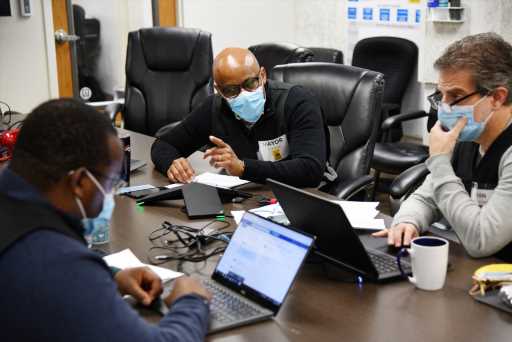After more than a year of pandemic lockdowns, layoffs and budget shortfalls, Denver is turning toward the months ahead by focusing on three priorities, Mayor Michael Hancock said Wednesday: shoring up the economy, helping the homeless and overall safety.
To that end, Hancock said he will soon propose a $400 million bond measure for the November ballot to invest in infrastructure and build back what was lost.
“Infrastructure needs to be more than roads and bridges and buildings,” Hancock said. “As we recover from COVID-19, we must recover in a way that addresses fundamental changes in equity, workplace training and jobs for the future.”
The local economy will get a boost this summer from Major League Baseball’s decision to relocate its All-Star Game to Denver, as well as restrictions on events like concerts and conferences continuing to loosen.
But there’s still uncertainty, especially when it comes to how much money the federal government will send to Denver from second wave of stimulus spending. The city’s chief financial officer, Brendan Hanlon, told City Council members last week it could be as low as $140 million and as high as $311 million.
City officials could use that money to backfill the city’s estimated $190 million budget shortfall in 2021. Hancock also noted that incoming federal money can be used to restore city services, expand internet coverage and help local businesses.
The first round of federal money — $127 million from the Coronavirus Aid, Relief and Economic Security (CARES) Act — mostly went to economic recovery, emergency sheltering for the homeless and general citywide operations like payroll expenses.
Tami Door is president and CEO of the Downtown Denver Partnership, a nonprofit that advocates for downtown businesses. She said the city could also help companies launch and grow, attracting new businesses from across the world and investing in infrastructure.
“We just need to focus on building a really incredible city that’s a place where people want to live, work, visit and do business,” Door said.
Hancock didn’t immediately provide details about the plans for both public safety or for thousands of people who live on Denver’s streets and in shelters. Cathy Alderman, vice president of communications and public policy for the Colorado Coalition for the Homeless, said transitioning people into permanent housing requires more money.
Service providers for the homeless have been in “triple crisis mode” for more than a year now — and she believes there’s still a need for legal homeless encampments, mental health services, vaccine education, COVID-19 testing.
“We still anticipate an eviction crisis in the coming months and there’s not a strong enough safety net or shelter system to help the current population much less an increased population,” Alderman said.
At the same time, Hancock’s administration continues to sweep out illegal homeless encampments throughout town, a practice which Alderman and other experts have painted as harmful and counterproductive.
This is a developing story and will be updated.
Source: Read Full Article
